.
News
Liturgy Lab: God as Female
Introducing Liturgy Lab
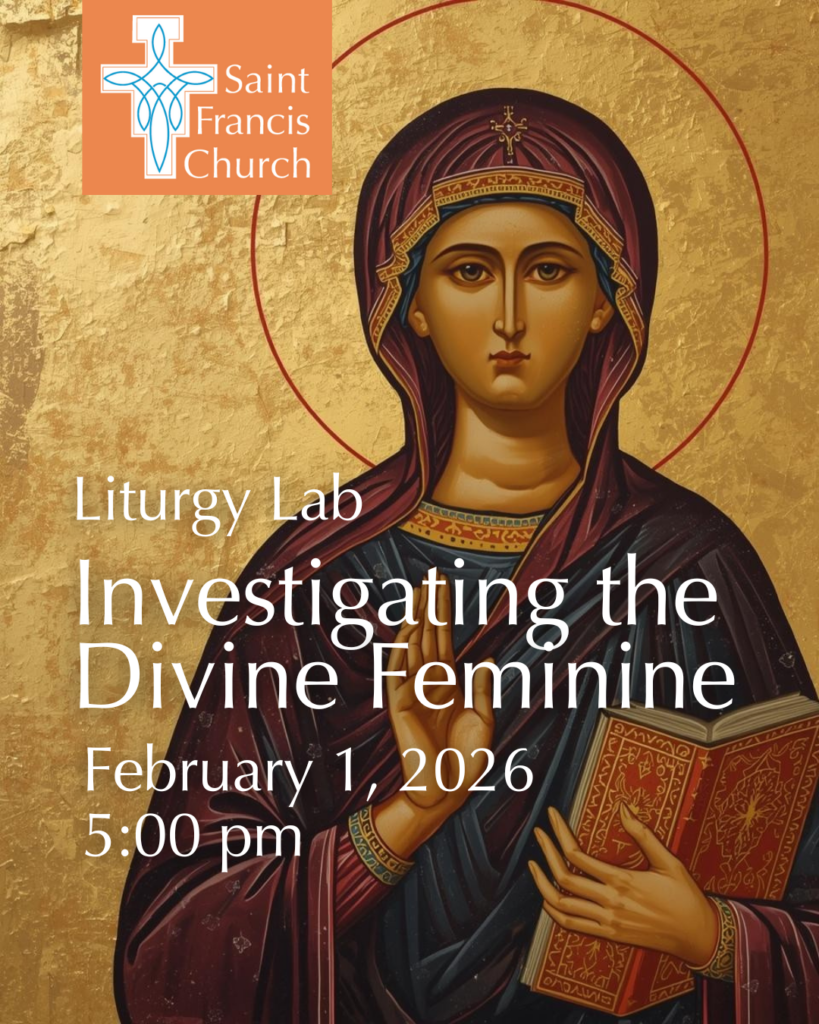
Join us for a special liturgy on February 1 at 5:00 p.m. in the Chapel
Is God feminine as well as masculine?
Genesis 1:27 proclaims both male and female to be made in the image of God. However, we typically see and hear exclusively masculine pronouns and names for God in our liturgy on Sundays. This can create the sense that, even when we affirm that men and women are both created in God’s image, males are, well, closer to God’s image.
What would it be like to hear and speak of God using feminine terms?
You are invited to come and explore this question in community at a special evening liturgy put together by our Discerner, Cara Nilsen with Fr. Jason as Celebrant.
The service will be followed by dinner, and a safe and welcoming discussion where we can process feelings or questions that come up for anyone.
All are welcome—come worship, wonder, and share the table with us.
📍 St. Francis Episcopal Church, Palos Verdes Estates
📞 (310) 375-4617
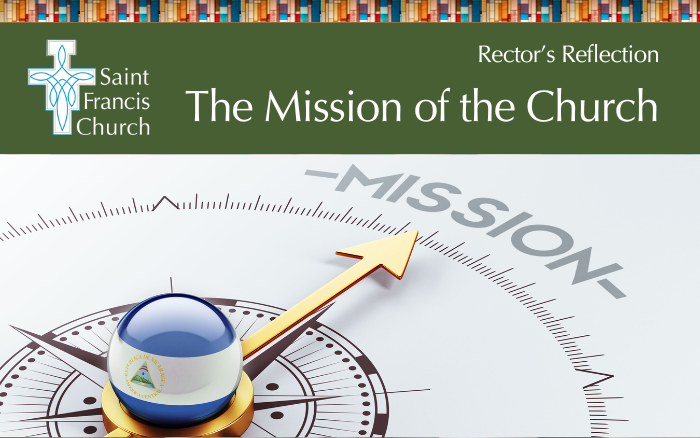
The Mission of the Church
What is the mission of the church? According to our catechism, it’s to restore all people to unity with God and each other in Christ, through prayer, worship, proclaiming the gospel, and promoting peace, justice, and love. This is accomplished through the ministry of all its members. How well are we fulfilling this mission at St. Francis?
From January to December, we had the following events (please excuse any omissions): Lunar New Year hosted by St. Theresa’s, Mardi Gras, Lenten Program and Dinner, Jesus Christ Superstar watch party, the Antiques Show, Art Camp, the Rummage Sale, Women’s Lectionary Study, Trunk-or-Treat with Ancient Ways Karate, Christmas Celebration with Ancient Ways Karate, St. Anne’s Auction, Nativity Set Construction, and Christmas Cookie Exchange. We also hosted the Bishop on Palm Sunday, a confluence of events that was incredibly challenging, and executed perfectly; numerous baptisms and funerals, an Agape Meal/Foot Washing on Maundy Thursday, cinnamon rolls and mimosas on Mother’s Day, delicious BBQ on Get Connected Sunday, and our coffee hour treats after church get better and better. We have the weekly healing service, monthly Taizé service, and our annual Blessing of the Animals. We also have the weekly grief group, Women’s Lectionary Study, and Youth Group. Both St. Anne’s women’s group and the Men’s Group meet monthly. Nearly every week, there is a chance for us to invite someone to an event that isn’t church, though my hope and prayer is that you feel comfortable enough to ask people to “come and see” what is happening at St. Francis.
We also offer a number of opportunities to serve the outside community. We serve breakfast six times a year at St. Luke’s Episcopal Church in Long Beach, make quarterly collections and deliveries of items for families at Camp Pendleton, and sort through the clothing and other items in the Blue Bin every other week. Last January, we collected food and supplies for firefighters and rescue workers, food for people who otherwise wouldn’t have Thanksgiving, gifts for children in foster care, and gift cards and supplies for a young man aging out of foster care. We are a community striving to live out our baptismal creed: to seek and serve Christ in all persons, respect the dignity of every human being, and promote justice and peace among all people. This is not something any of us does alone, but together, as a community, and always with God’s help.
The Rev. Jason Shelby
Rector
jason.shelby@stfrancispalosverdes.org
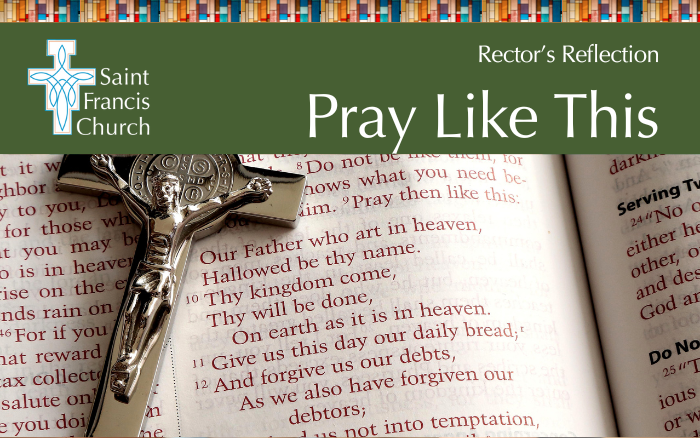
Pray Like This
Jesus said to his disciples, “Pray like this: Our Father in heaven, hallowed be your name. Your kingdom come. Your will be done, on earth as it is in heaven. Give us this day our daily bread. And forgive us our debts, as we also have forgiven our debtors. And do not bring us to the time of trial, but rescue us from the evil one,” (Matthew 6:9-13, NIV).
“Your will be done, on earth as it is in heaven.” Your will be done…Is there anything more difficult than thwarting our own will, or putting the will of another ahead of ours? In twelve-programs the third step is: [We have] Made a decision to turn our will and our lives over to the care of God as we understood Him. When I pray the third step, I simply say, “I give you my life and my will.” I do this every night before I go to sleep; I pray the Lord’s Prayer, the Jesus Prayer (Lord Jesus Christ, Son of God the Father, have mercy on me a sinner), and the first three steps of the twelve steps. In the space of a few minutes, I say to God that I want God’s will to be done, and on the best of days, I give God my will, and then take it back again shortly afterwards. What is the will of God? To love the Lord our God with all our heart, with all our mind, and with all our strength, and to love our neighbor as ourself. That is the will of God – that we love, and as Thomas Aquinas said, to love means to will the good of the other.
Willing the good of the other is incredibly disruptive to my life, especially if the others I am willing the good to are not willing the good of me, like my children. They don’t wish me ill (though I am the worst father in the world, according to at least two of them), but they do demand a lot. Usually, they wait until I sit down, at which point they will ask me for something to eat or drink, or to go play with them in the backyard. I usually try to accommodate them, though not as quickly as they would like. I don’t want to spoil them, but I do want to model what it means to help others. It’s been slow to stick…when asked to put their candy wrappers in the trash, there is much wailing and gnashing of teeth, which only increases if we threaten to remove candy from the house. But it’s starting to work too…they both want to help unload/load the dishwasher, sweep the floor, and wash/dry clothes.
Willing the good of the other takes practice; it’s not something that will happen all at once. There will never be a time we don’t need Jesus – we will never become perfect at being selfless. But we can definitely improve from where we are. When I pray the Lord’s Prayer, I want to be genuine – I want to mean it when I say, “Thy will be done, on earth as it is in heaven.” God’s will in heaven is that we willingly and lovingly follow the first two commandments, that when everyone is seeking the good of the other—when everyone is loving one another—then no one is left out. But every day, there is a significant gulf between praying the words and living the words, and it is this gulf that reinforces my need for Christ and his grace.
We are blessed (or cursed, depending on your view) to be able to hold opposing viewpoints in our minds at the same time. Yes, I pray and want to do God’s will, but I do not do God’s will, and because of this, I need God’s grace, provided through the love of God’s son, Jesus. It’s as Paul says in his letter to the Romans, “I do not do the good I will, but I do the very thing I hate.” Recognizing our sin is the first step to working through it. We can’t help everyone, though we may will the good of everyone we see, we cannot make it a reality. But we can pray for everyone we see, recognizing that Christ dwells within all people, and that when we serve one another, we are serving Christ.
The Rev. Jason Shelby
Rector
jason.shelby@stfrancispalosverdes.org
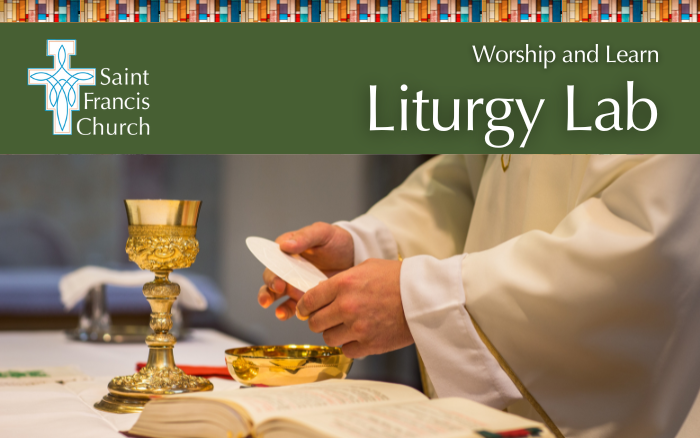
Introducing Liturgy Lab at St. Francis
St. Francis Episcopal Church is launching Liturgy Lab—a new evening worship series that invites us to explore historic and alternative forms of the Eucharist in a thoughtful, hands-on way.
📅 Sunday, February 1, 2026
🕔 5:00 pm
Each Liturgy Lab gathering includes worship, followed by dinner and conversation, where we’ll reflect, ask questions, and deepen our understanding of why we worship the way we do. Whether you’re curious about liturgy, love learning something new, or simply want a meaningful way to gather in community, Liturgy Lab is for you.
All are welcome—come worship, wonder, and share the table with us.
📍 St. Francis Episcopal Church, Palos Verdes Estates
📞 (310) 375-4617
📧 shelley.reece@stfrancispalosverdes.org
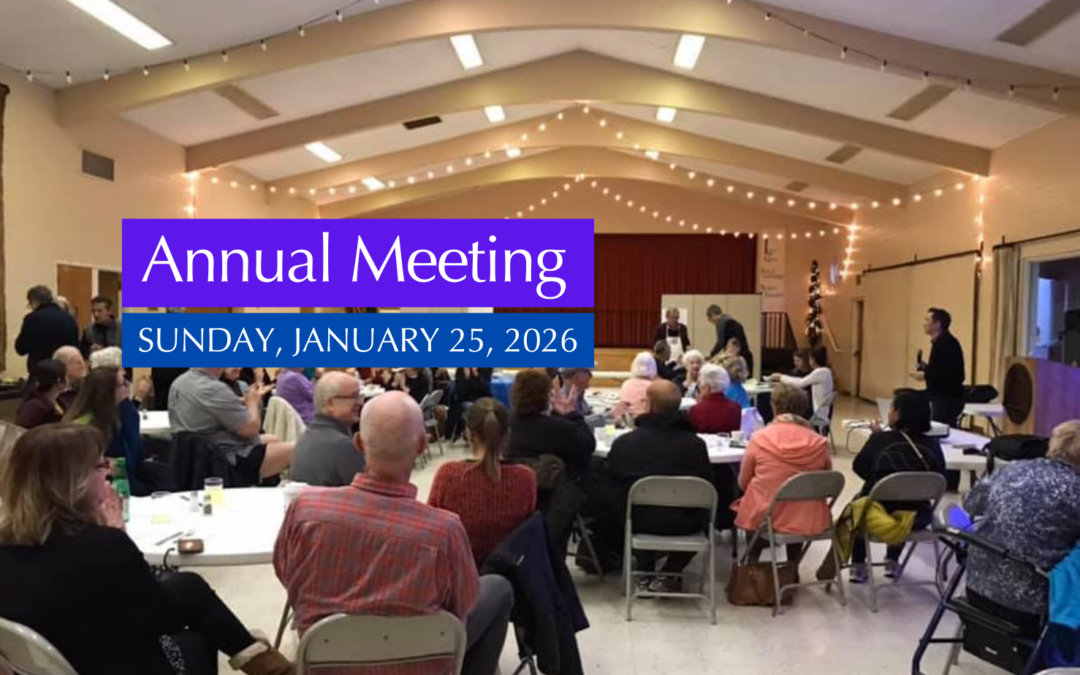
Annual Meeting 2026
St. Francis Annual Meeting
Sunday, January 25, 2026
11:30 am
All St. Francis parishioners and friends are invited to the Annual Meeting of our Parish. Be a part of the conversation as we review the past year, present our financial statements, and vote for new members of our Vestry.
We hope to see you there!
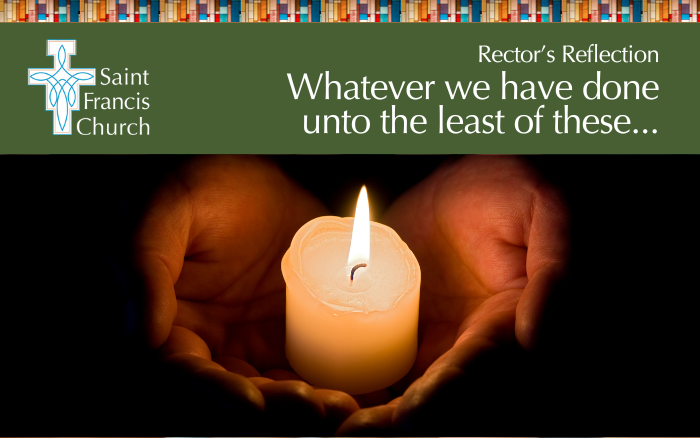
Whatever we have done unto the least of these…
Renee Nicole Good was shot and killed by an ICE officer yesterday morning in Minneapolis, Minnesota. This is a verifiable fact. She was a mother, a daughter, and a child of God. She was 37 years old. Three of those four things can be proven empirically, while one is based entirely on faith. It is likely that there has been more said about her in the past 36 hours by more people than in the entirety of her life. There are those that are hailing her as a hero and martyr, while others vilify her and say that she got what she deserved. Who deserves to be shot in the head?
If we seek and serve Christ in all people while respecting the dignity of every human being, we cannot say that anyone deserves to be murdered. Dietrich Bonhoeffer, the famous German theologian, said that if he were able to murder Hitler, he would do it for the good of humanity. But he also said that he was willing to cast his soul into hell for the sin of taking another person’s life. He unequivocally named murder a sin, for which there is no excuse. It’s much easier to say that someone needs to be killed or taken out for the betterment of humanity, and easier still to say that it’s good to remove such people from the world. Does Jesus call the death of any person good?
The most difficult funeral I’ve ever done was for a young man who had struggled with addiction for all of his adult life, until the day he died of an overdose. He was in and out of rehab at least ten times, and his family stuck by him the whole time. On the day of his funeral, it was standing room only in the church. The family was standing in the narthex waiting to process into the church, and they had to squeeze to the sides to make way for the casket. The young man’s mother was wearing sunglasses and standing stone straight as he went by, and as my eyes moved from her to the casket, I crumpled and wept. The young man’s father gave me a big hug and slapped me on the back, then walked ahead of me into the church.
I pulled myself together and walked into the church, the last person in line, directly behind the casket. We lived in a small town, and there was no shortage of opinions, good and bad, about the young man and his family. But there was also an outpouring of love and support for the family; all squabbles and divisions were set aside, and people went out of their way to offer their condolences.
There will likely be a funeral service for Renee Good. I can’t imagine celebrating that service, talking about the hope of the resurrection and the promise of the kingdom to come, all the while knowing that there are people outside the church with loud voices and a long reach saying that Renee Good deserved to die. She will be called many things over the next few weeks (hero, martyr, terrorist, agitator), until her name fades into the background and the next tragedy dominates our attention. But to her children, she will always be mom; to her friends and family, she will always be Renee. They are the ones left here to struggle and find their way, and they are the ones who will bear all of the slights made against the person they dearly loved and lost. If we truly believe that whatever we have done unto the least of these we have done unto Christ, then let us act in accordance and honor our savior by honoring one another.
The Rev. Jason Shelby
Rector
jason.shelby@stfrancispalosverdes.org
Youth and Programming in 2026: Liturgy, Learning, and Life Together
Happy New Year, St. Francis! I hope this season has been one of rest, joy, and renewal for you and your loved ones. As we step into 2026, I want to say how genuinely good it feels to be back together after the holidays and to look ahead at all that is unfolding in the life of our parish. There is so much to be grateful for, and so much to be excited about!
First, I am thrilled to announce the launch of Liturgy Lab, beginning on February 1. These will be evening services held at 5:00 pm, once a month, designed to explore historic and alternative forms of the Eucharistic service. Liturgy Lab is meant to be experiential and communal: we’ll worship together, then gather for dinner and conversation to reflect, learn, and ask questions. It’s an invitation to deepen our understanding of the liturgy by fully participating in it. More details are coming soon, and I can’t wait to share them with you!
On February 15, we will offer an Instructive Eucharist, a rare and wonderful opportunity to walk through the service step by step, with explanations of what we do and why we do it. This is especially meaningful for anyone who is curious about the rhythms of worship, and whether you’re new to the church or have been here for years, I hope you’ll join us.
I’m also happy to share that our Youth Group, Teen Tuesdays, met again on January 6 and will continue meeting every Tuesday in the Parish Hall, just as before. All teens ages 13–19 are warmly welcome to attend—friends included! It’s a relaxed, supportive space to connect, ask questions, and build community.
Finally, a reminder that Faithful Families will continue in 2026, with a small change: beginning in February, our monthly potluck will move to the fourth Sunday of each month. As a reminder, all families are warmly welcome to share a meal, connect, and spend time together after our Sunday morning worship.
Thank you for being such a vibrant and caring community. I am so grateful to walk into this new year with you, and I look forward to all that God has in store for us at St. Francis!
Shelley Reece
Missioner for Programming and Youth
shelley.reece@stfrancispalosverdes.org
An Evening of Music at St. Francis
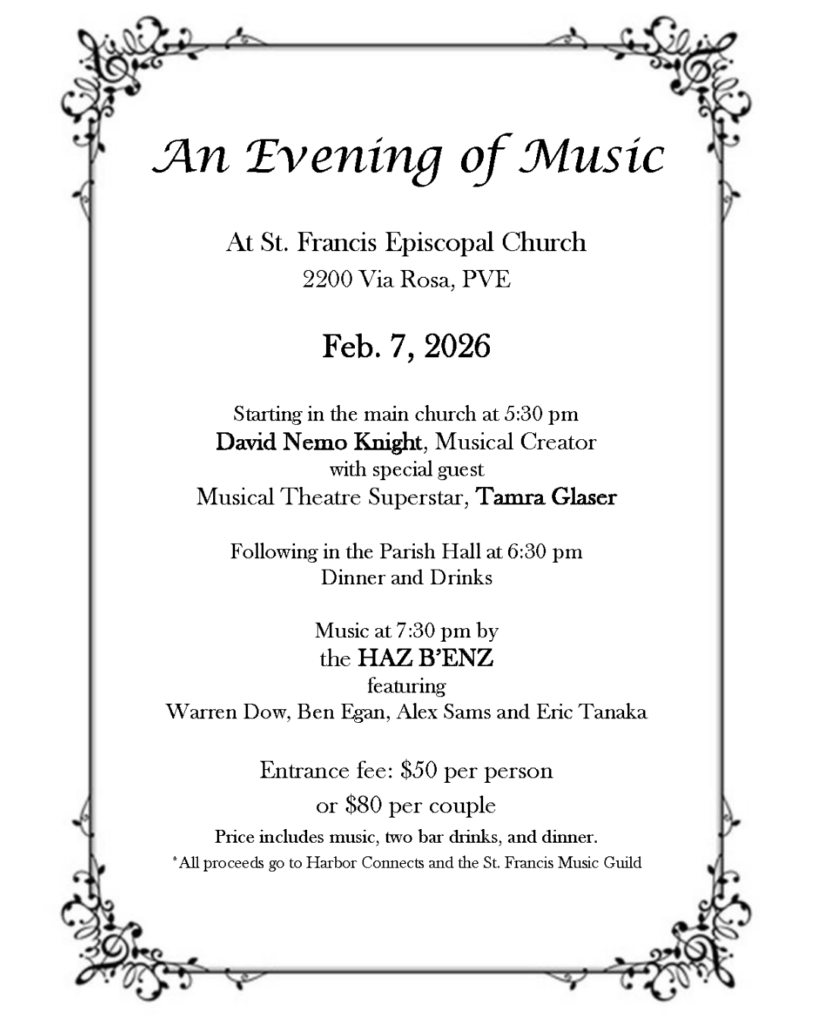
St. Francis Episcopal Church warmly invites you to join us for An Evening of Music, a special fundraiser in support of Harbor Connects and the St. Francis Music Guild, on Saturday, February 7, 2026, at 5:30 pm.
This joyful evening will celebrate the power of music and community, featuring David Nemo Knight, Musical Creator, with a very special guest appearance by musical theatre superstar Tamra Glaser. Following the opening performance, enjoy dinner and drinks in the Parish Hall at 6:30 pm.
At 7:30 pm, the evening continues with a high-energy set from HAZ B’ENZ, featuring Warren Dow, Ben Egan, Alex Sams, and Eric Tanaka, for even more great music and fun.
Tickets:
- $50 per person
- $80 per couple
Your ticket includes live music, dinner, and two bar drinks, and all proceeds benefit Harbor Connects and the St. Francis Music Guild. Kathy Capellino is catering the event—braised short ribs and roasted salmon are on the menu.
About Harbor Connects
Harbor Connects was founded during the early days of the pandemic by a group of committed community leaders to support individuals and families in the harbor area facing urgent need. Now an independent nonprofit, Harbor Connects works to fight homelessness by connecting people directly to resources, mentoring, and advocacy; strengthening service providers through gap-filling support; and fostering collaboration across organizations. Their work focuses on those at risk of losing housing, those moving into housing, and neighbors currently experiencing homelessness. You can learn more about Harbor Connects on their website at https://harborconnects.org/
Come enjoy an evening filled with beautiful music, good food, and meaningful impact—we look forward to welcoming you!
Celebrate the Year of the Horse

Join us for one of St. Francis’ most joyful and beloved traditions! St. Teresa’s Guild invites the whole parish and community to our Annual Lunar New Year Event on Friday, February 6, from 6:00–8:00 pm in the St. Francis Parish Hall.
This festive evening is fun for the entire family and includes a delicious Chinese dinner prepared by our talented guild members, lively entertainment, and a live auction filled with unique items and special treasures. It’s a wonderful opportunity to gather, celebrate, and support meaningful causes—everyone leaves with something special!
Proceeds from this event support organizations that care for women, children, and families in need, including Mama Hill’s Help, House of Hope, Rainbow Services, and St. Francis Outreach, including St. Luke’s Episcopal Church’s Homeless Ministry in Long Beach.
Tickets:
- $10 in advance
- $13 at the door
- Children under 4 are free
Advance tickets may be purchased through the church office (310-375-4617) or by contacting Robin Pano (310-779-0486).
Come celebrate the Lunar New Year with great food, joyful fellowship, and generous hearts. We look forward to seeing you there!
Military Outreach in January 2026
St. Francis’ Military Outreach ministry is honored to once again support the Camp Pendleton & Fort MacArthur Collection Drive 🇺🇸💙
Together with Rotary District 5280, we’re collecting new and gently used items to support military families—many arriving with very little—as they care for newborns, young children, and settle into new homes. Donations will go directly to Camp Pendleton’s Warrior Warehouse and Fort MacArthur’s Airman’s Attic, where items are freely available to families in need.
🍼 Items needed include: diapers, baby & children’s clothes, toys, books, strollers, cribs, cookware, bedding, and $25 Target or Walmart gift cards.
📦 Drop-off deadline: Friday, January 9, 2026
📍 Bring items to the St. Francis church office or to Susie Zimmerman’s home (call/text for address).
🚗 Help needed Jan. 10: We’ll meet at St. Francis at 8:15 a.m. to load donations and head to Hawthorne High School.
To donate, help with drop-off, or learn more, contact
Susie Zimmerman
📧 susiehzimmerman@gmail.com
📱 (310) 316-5941
Thank you for helping us care for those who serve—and their families.

Topics
Join our Mailing List
Subscribe to stay in touch!
Our email newsletter is published every Thursday at 4:30 pm (Pacific).
Click here to sign up!
Got News?
Publication Deadline:
Tuesdays at Noon
To get news, events, or other notifications in our weekly email and worship bulletin announcements, send your news to info@stfrancispalosverdes.org by noon on Tuesday for publication on Sunday.
